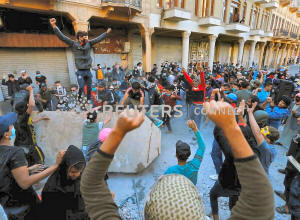Iraqi forces kill three protesters, cleric warns of crisis
 Send a link to a friend
Send a link to a friend
 [November 22, 2019]
By Ahmed Aboulenein [November 22, 2019]
By Ahmed Aboulenein
BAGHDAD (Reuters) - Iraqi security forces
killed three protesters in Baghdad on Friday and forcibly dispersed
protesters blocking the country's main port near Basra, as the country's
top cleric warned nothing but speedy electoral reforms would resolve
unrest.
Security forces opened fire and launched tear gas at protesters on a
central Baghdad bridge, police sources said. Two people died from bullet
wounds and one from a tear gas canister launched directly at the head.
At least 27 more were injured.
In the south, security forces reopened the entrance to Iraq's main port,
Umm Qasr, which protesters had blocked since Monday, port sources said,
but normal operations had not yet resumed.
At least 329 people have been killed since the start of mass unrest in
Baghdad and southern Iraq in early October, the largest demonstrations
since the fall of Saddam Hussein in 2003.

Protesters are demanding the overthrow of a political class seen as
corrupt and serving foreign powers while many Iraqis languish in poverty
without jobs, healthcare or education.
Iraq's top Shi'ite Muslim cleric, Grand Ayatollah Ali al-Sistani, called
on Friday for politicians to hurry up in reforming electoral laws
because the changes would be the only way to resolve weeks of deadly
unrest.
"We affirm the importance of speeding up the passing of the electoral
law and the electoral commission law because this represents the country
moving past the big crisis," his representative said during a sermon in
the holy city of Kerbala.
[to top of second column]
|

Iraqi demonstrators take part in ongoing anti-government protests in
Baghdad, Iraq November 21, 2019. REUTERS/Thaier al-Sudani

Sistani, who rarely weighs in on politics except in times of crisis,
holds massive influence over public opinion in Shi'ite-majority
Iraq. He also repeated his view that the protesters had legitimate
demands and should not be met with violence.
Unsatisfied by government reform promises they see as meager, many
protesters have turned to civil disobedience tactics in recent
weeks.
They had previously blocked Umm Qasr from Oct. 29-Nov. 9, apart from
a brief resumption of operations for three days. It receives imports
of grain, vegetable oils and sugar shipments that feed a country
largely dependent on imported food.
The initial blockage cost Iraq more than $6 billion during just the
first week of the closure, a government spokesman said at the time.
Protesters in Baghdad are also disrupting traffic, and are still
holding ground, controlling parts of three major bridges which lead
to the capital's fortified Green Zone, where government buildings
and foreign embassies are located.
(Reporting by Ahmed Aboulenein; Additional reporting by Aref
Mohammed in Basra; Editing by Mark Heinrich and Peter Graff)
[© 2019 Thomson Reuters. All rights
reserved.]
Copyright 2019 Reuters. All rights reserved. This material may not be published,
broadcast, rewritten or redistributed.
Thompson Reuters is solely responsible for this content. |